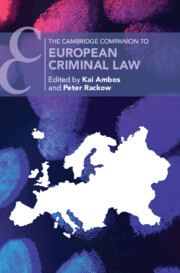Book contents
- The Cambridge Companion to European Criminal Law
- Cambridge Companions to Law
- The Cambridge Companion to European Criminal Law
- Copyright page
- Contents
- Notes on Contributors
- Preface
- Table of Cases
- Abbreviations
- Part I Foundations of European Criminal Law
- Part II Purposes and Principles
- Part III European Substantive Criminal Law
- Part IV European Criminal Procedure
- 10 Fundamental Rights Protection
- 11 Extradition and Surrender
- 12 Further Mutual Legal Assistance
- 13 Police (Operational and Other) Cooperation
- Part V Institutions
- Part VI Perspectives
- Bibliography
- Index
- References
11 - Extradition and Surrender
From a Bilateral Political Arrangement to a Triangular Legal Procedure
from Part IV - European Criminal Procedure
Published online by Cambridge University Press: 09 February 2023
- The Cambridge Companion to European Criminal Law
- Cambridge Companions to Law
- The Cambridge Companion to European Criminal Law
- Copyright page
- Contents
- Notes on Contributors
- Preface
- Table of Cases
- Abbreviations
- Part I Foundations of European Criminal Law
- Part II Purposes and Principles
- Part III European Substantive Criminal Law
- Part IV European Criminal Procedure
- 10 Fundamental Rights Protection
- 11 Extradition and Surrender
- 12 Further Mutual Legal Assistance
- 13 Police (Operational and Other) Cooperation
- Part V Institutions
- Part VI Perspectives
- Bibliography
- Index
- References
Summary
This chapter begins by addressing classic extradition, its historical roots and the key moments in its evolution, notably its permeation by fundamental rights after World War II, which has caused it to shift from a bilateral political arrangement to a ‘triangular’ (Eser) legal procedure where the individual concerned plays an active role. It assesses the main grounds for refusal – such as nationality, political offences and dual criminality –, and the variation into which they have developed within the European Union. The chapter then delves into the European Arrest Warrant, where proceedings have been fully judicialised and grounds for refusal considerably narrowed. The authors examine the question of whether (and to which extent) the European Arrest Warrant and the underlying principle of mutual recognition have brought about a radical change of paradigm, especially in the light of the (welcomed) ruling of the Court of Justice of the European Union in Aranyosi and Căldăraru. The conclusion anticipates the challenges that lie ahead and underscores the key role of the Court of Justice for the preservation of the whole European arrest warrant system.
Keywords
- Type
- Chapter
- Information
- The Cambridge Companion to European Criminal Law , pp. 254 - 282Publisher: Cambridge University PressPrint publication year: 2023

